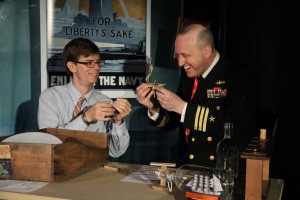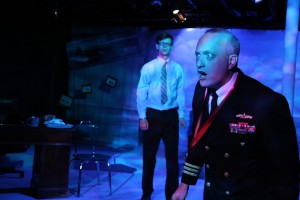CARRYING THE ALBATROSS
Adrift takes its inspiration from Samuel Taylor Coleridge’s Rime of the Ancient Mariner, which tells the story of a sailor stricken by horrible misfortune after he shoots down an albatross, his ship left stranded on still seas. Things aren’t so bad in David Alex’s modern day play, which makes its world premiere at Greenhouse Theater Center, but it still seems a bit aimless, brought down by a script that doesn’t quite let its characters fully unfurl. The story primarily follows Isaac Abbas (Colin Henry Fewell), an idealistic young geometry teacher who works at his first job under test score-obsessed principal Judd Benz (Gary Murphy). While Isaac attempts to grow as an educator, he also reaches out to Judd’s son Tom (Eric Ryan Swanson), whose strained relationship with his father echoes the challenges Isaac faced with his own dad, Jack Abbas, a deceased veteran (James Eldrenkamp).
 Mr. Alex doesn’t take any easy roads with these relationships, presenting both fathers’”Judd and Jack’”as complicated figures who definitely love their sons even though other priorities often get in the way. Mr. Alex creates a terrifically two-faced character with Judd, who is both an affable and intellectual employer to Isaac while working to outsmart him and keep him firmly under control. But his conflicts with his son at home seem more artificial, showing disappointment even in the face of strong achievement and offering personal revelations that make his earlier criticism even more unlikely.
Mr. Alex doesn’t take any easy roads with these relationships, presenting both fathers’”Judd and Jack’”as complicated figures who definitely love their sons even though other priorities often get in the way. Mr. Alex creates a terrifically two-faced character with Judd, who is both an affable and intellectual employer to Isaac while working to outsmart him and keep him firmly under control. But his conflicts with his son at home seem more artificial, showing disappointment even in the face of strong achievement and offering personal revelations that make his earlier criticism even more unlikely.
Jack was a career naval officer and Vietnam veteran obsessed with loyalty and honor. His flashback scenes with Isaac provide the show’s strongest work. In one scene, his teenage son celebrates when his father tells him “You’ve got balls,” saying it’s the best compliment Jack has ever paid him. When Jack retorts that he’s always told his son he was proud of him, it resonates when Isaac says that’s not the same.
 In the present, Jack looms over Isaac’s shoulder as he goes through challenging parts of his days, whispering advice and jeering at him, showing the constant presence of his influence. It’s just one example of director Maggie Speer’s excellent blocking. When Isaac addresses the audience, which becomes his unruly class, paper airplanes whiz out from the aisles. The most memorable aspect of the show may be the set, designed by Dennis Mae, which provides layers of glass covered with objects that represent the characters shifting priorities: seashells and geometry tools; the old Navy posters of Jack’s past and the model boats that are his new hobby; and the golf clubs that represent Judd’s greatest passion. It’s all perfectly complimented by Jake Bray’s lighting design, which casts a mellow blue hue over the scene, then changes to a violent red to coincide with episodes of Jack’s Post Traumatic Stress Disorder-induced rage and terror.
In the present, Jack looms over Isaac’s shoulder as he goes through challenging parts of his days, whispering advice and jeering at him, showing the constant presence of his influence. It’s just one example of director Maggie Speer’s excellent blocking. When Isaac addresses the audience, which becomes his unruly class, paper airplanes whiz out from the aisles. The most memorable aspect of the show may be the set, designed by Dennis Mae, which provides layers of glass covered with objects that represent the characters shifting priorities: seashells and geometry tools; the old Navy posters of Jack’s past and the model boats that are his new hobby; and the golf clubs that represent Judd’s greatest passion. It’s all perfectly complimented by Jake Bray’s lighting design, which casts a mellow blue hue over the scene, then changes to a violent red to coincide with episodes of Jack’s Post Traumatic Stress Disorder-induced rage and terror.
 Adrift’s script is on the dry side (Fewell’s stiff portrayal of Isaac too often magnifies that, making the dialogue come off as wooden), but things are worse when the playwright shifts too far in the other direction: The ending is the show’s most disappointing moment, a melodramatic display suggesting that Isaac will be as haunted and damaged as his father due to his own tough decisions; the character’s ultimate suffering seems tacked on. The Rime of the Ancient Mariner is about carrying the burden of your actions; Mr. Alex nobly attempts that theme with Adrift, but the very theme that inspired this play ultimately got in the way of producing both satisfying characters and conclusion.
Adrift’s script is on the dry side (Fewell’s stiff portrayal of Isaac too often magnifies that, making the dialogue come off as wooden), but things are worse when the playwright shifts too far in the other direction: The ending is the show’s most disappointing moment, a melodramatic display suggesting that Isaac will be as haunted and damaged as his father due to his own tough decisions; the character’s ultimate suffering seems tacked on. The Rime of the Ancient Mariner is about carrying the burden of your actions; Mr. Alex nobly attempts that theme with Adrift, but the very theme that inspired this play ultimately got in the way of producing both satisfying characters and conclusion.
photos by Johnny Knight
Adrift
Polarity Ensemble Theatre at Greenhouse Theater Company in Chicago
scheduled to end on Aug. 26, 2012
for tickets, visit http://www.greenhousetheatercenter.org
for info on this and other Chicago Theater, visit http://www.TheatreinChicago.com

